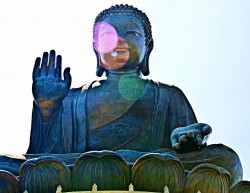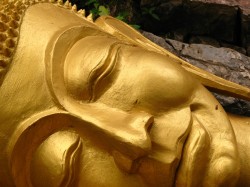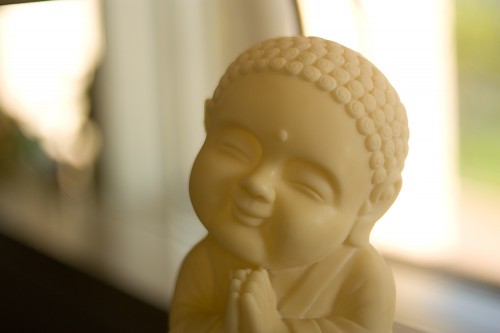The way that we relate to our daily activities determines the quality of life we are experiencing.
I’d like to share a subject I think is vital both to our overall well-being, as well as our spiritual practice—the contemplation of how our work in the world can be both a support for our material needs, as well as a vehicle for deepening insight.
He listed it as the fifth limb: Right Livelihood.
This is an area of life we spend so much of our time with, involving our body, our speech and our minds.
Whether we work at home or in the world, whether we directly receive financial income or support others who do, our lives become whatever we focus on. However, the main ingredient in promoting happiness seems to have little to do with what we do to make a living and everything to do with our attitude toward what we do. Whether we dig ditches and love our job, perhaps unlikely, or are an artist who feels burdened by the process of creativity, the way that we relate to our daily activities determines the quality of life we are experiencing.
The Buddha is often quoted as saying he taught only two things:
1. about suffering
2. about the end of suffering.
All the various teachings in Buddhism with their many lists all point back to these two main themes:
1. suffering: being disconnected from our essential ground of being.
2. The end of suffering: the potential to wake up to our innate nature, our wisdom and compassion.
The Eightfold Path of Buddhism is a gradual cultivation of behaviors and insights that investigate these two themes in all our changing moments and waking existence. We can sometimes assume our life and responsibilities are in the way of this kind of dedicated investigation and complain that we have no time to practice or contemplate. However, our life is not in the way, as the Taoists say, the Way is through our life.
In every moment, we are either moving toward suffering, resistance and struggle or toward openness, insight and connection.
The Eightfold Path can be sectioned into three categories: Morality, Meditation, Wisdom (Sila, Samadhi, Prajna).
The first two limbs (Right View and Right Thinking) cultivate wisdom through experiential understanding and intentional thought. The second three develop an ethical nature through Right Speech, Right Action, and Right Livelihood. The last three establish meditation as a means for arousing a stable quality of attention, personal insight, and kind hearted integrity through Right Effort, Right Mindfulness and Right Concentration.
Although they all have influenced me, one of my teachers, Bhante Gunaratana, emphasized the three most important limbs needed to further the evolutionary process of each one: Right View, Right Effort, and Right Mindfulness.
These are called the Three Cardinal Points.
When I sincerely started practicing these three limbs in my daily life, I became aware of what a transformative influence they played in my relationship to my work and my overall life.
Right View encourages not only sincere contemplation of the four ennobling truths, but also introduces the theme of karma as actions and reactions that generate particular consequences; enforcing a view of personal responsibility in not only how we behave, but how we relate to what’s happening. Wise effort allows us to be less blind to this causation as we learn to identify and diminish our unwholesome tendencies, while recognizing and training up a heart based attitude fueled by discriminating wisdom, which of course skillful Mindfulness practice engenders.
 The Buddha was less concerned with a person’s station in life or what they did for a living, and cared more about how each of us is relating to our moment to moment experience, whatever it is we are doing. He did, however, list certain impediments on the path of awakening that our jobs can cause that are to be avoided. He listed them in two categories:
The Buddha was less concerned with a person’s station in life or what they did for a living, and cared more about how each of us is relating to our moment to moment experience, whatever it is we are doing. He did, however, list certain impediments on the path of awakening that our jobs can cause that are to be avoided. He listed them in two categories:
1. Avoid trading weapons, people, meat*, intoxicants and poisons.
2. Avoid jobs that disturb the mind and cause one to use harmful speech and actions.
If we are interested in aligning our work day with our spiritual aspirations for insight, peace and well being, we will need to be willing to make changes in ways that may not be easy.
It is only when we reflect on whether our work causes harm to one’s self or others, to animals, or to the environment that we can begin to move toward abandoning these sources of income in favor of activities that support life enhancing ways of being.
The world is in desperate need of people who care about developing human intelligence, awareness and personal empowerment, protecting animal rights and saving and improving environmental sustainability, to name just a few.
The Buddha also suggested avoiding jobs that disturb the mind, including any activity that promotes harmful speech, lying, gossiping, or activities that involve killing, stealing, or sexual misconduct.
With the above guidelines as parameters for basic ethical choices when choosing or changing careers, we may need to be reminded that in every job, even those we love, there will be repetition, and times that are difficult.
Before I meditated I easily judged the low moments as indications that I was not in the right occupation, that something was wrong with me, or this job, or simply me in this job. When I was caught by this kind of unexamined belief I would either escape the living moment by fantasizing, or I would assume this occupation was not worth giving my energy and time to, feeling trapped and aversive, causing even more suffering.
Once I began to meditate and study the dharma, I began to understand how this grasping at ultimate fulfillment in every moment through my work or through any activity was delusional.
I could see how freeing my heart and mind of assumptions and reactivity was the only way I would experience true lasting peace.
I began shifting from the compulsion to do something meaningful with my life (although that is still important to me), to finding meaning in simple ordinary moments lived mindfully. Although I was not literally killing or stealing before, I was killing the potential for direct and simple connectedness to actions and stealing from the generosity of life by ignoring the preciousness of simple moments.
This has helped me find endless value in helping others come home to their bodies and minds with freshness and openness as a yoga teacher, even though I have been doing this same activity for 28 years now.
It is a natural desire to want to share the insights we feel grateful for and these changes in perception and behavior motivate many people to become teachers or leaders. These experiences of authentic receptivity and connectedness are harbingers of a possible life lived authentically, free of our constraining habits of reactivity and disconnection.
A change in occupation is often the first step we desire to take in order to move toward living these truths more often.
The potential pitfall in turning our insights into methods we prescribe for others to follow is the assumption that we have integrated our understanding fully, before this is actually the case. We can then become so busy teaching our new found insights that we repress any un-evolved aspects of ourselves in order to hold up the presentation of the one who knows, creating another paradigm for in-authenticity and egocentrism.
If we are successful in attracting others, we will have even less incentive and time to pursue a sincere inquiry into all the ways we are still bound by conditioning.
I witnessed this situation with a friend of mine.
He is extremely intelligent and has had an interest in spiritual practice for a long time, supported by a close association with an enlightened master. Having been both a scientist and an academic psychologist, he began to desire more contact with people. He attracted a lot of students in a short amount of time—he was bright and intuitive. He began to feel excited as he witnessed people having life changing insights through their time with him. They also began adoring him, showering him with praise, gifts and invitations. He began to believe and identify with this specialness, seeing more and more people, while time for his self-practice became less and less.
Eventually, many women came forward with complaints of sexual inappropriateness and manipulation. There are many such stories, but the beauty of this one is that once this all came out, he really faced his delusion, quit working and went into therapy and on a long personal retreat.
 He used the experience to fuel a deepening commitment to genuine wakefulness.
He used the experience to fuel a deepening commitment to genuine wakefulness.
If our practice is sincere and our spiritual attainments are genuine, we will no doubt experience an increased success in our work. We need to continually remind ourselves that genuine happiness is not so much about what we are doing to make a living, or whether we are in a period of success of failure, praise or blame (although these times will require skillful rumination).
The essential point is that each experience is a doorway, a portal into the potential to deepen our understanding of our vulnerability to cause and experience suffering.
The road home to the end of suffering necessitates continual inspired effort to be mindful in all our waking moments, whether on the cushion or at work, gradually learning to recognize and stabilize our true ground of being.
*Today the business of organic pasture raised animals and animal products helps many people.
Love elephant and want to go steady?
Sign up for our (curated) daily and weekly newsletters!
Assistant Editor: Alicia Wozniak/Editor: Catherine Monkman
Photos: elephant journal archive
Relephant Bonus:



Read 0 comments and reply